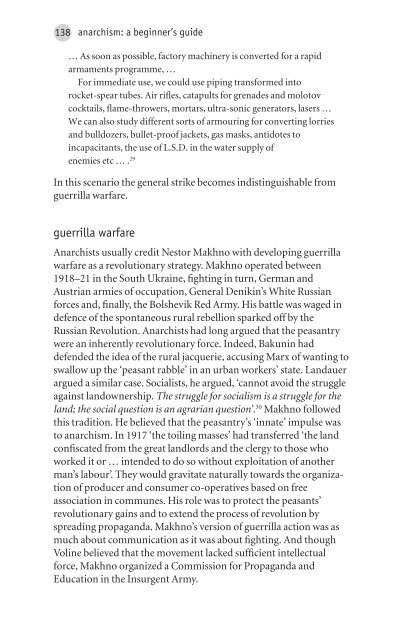o_195qg5dto17o4rbc85q1ge61i84a.pdf
You also want an ePaper? Increase the reach of your titles
YUMPU automatically turns print PDFs into web optimized ePapers that Google loves.
138<br />
anarchism: a beginner’s guide<br />
… As soon as possible, factory machinery is converted for a rapid<br />
armaments programme, …<br />
For immediate use, we could use piping transformed into<br />
rocket-spear tubes. Air rifles, catapults for grenades and molotov<br />
cocktails, flame-throwers, mortars, ultra-sonic generators, lasers …<br />
We can also study different sorts of armouring for converting lorries<br />
and bulldozers, bullet-proof jackets, gas masks, antidotes to<br />
incapacitants, the use of L.S.D. in the water supply of<br />
enemies etc … . 29<br />
In this scenario the general strike becomes indistinguishable from<br />
guerrilla warfare.<br />
guerrilla warfare<br />
Anarchists usually credit Nestor Makhno with developing guerrilla<br />
warfare as a revolutionary strategy. Makhno operated between<br />
1918–21 in the South Ukraine, fighting in turn, German and<br />
Austrian armies of occupation, General Denikin’s White Russian<br />
forces and, finally, the Bolshevik Red Army. His battle was waged in<br />
defence of the spontaneous rural rebellion sparked off by the<br />
Russian Revolution. Anarchists had long argued that the peasantry<br />
were an inherently revolutionary force. Indeed, Bakunin had<br />
defended the idea of the rural jacquerie, accusing Marx of wanting to<br />
swallow up the ‘peasant rabble’ in an urban workers’ state. Landauer<br />
argued a similar case. Socialists, he argued, ‘cannot avoid the struggle<br />
against landownership. The struggle for socialism is a struggle for the<br />
land; the social question is an agrarian question’. 30 Makhno followed<br />
this tradition. He believed that the peasantry’s ‘innate’ impulse was<br />
to anarchism. In 1917 ‘the toiling masses’ had transferred ‘the land<br />
confiscated from the great landlords and the clergy to those who<br />
worked it or … intended to do so without exploitation of another<br />
man’s labour’. They would gravitate naturally towards the organization<br />
of producer and consumer co-operatives based on free<br />
association in communes. His role was to protect the peasants’<br />
revolutionary gains and to extend the process of revolution by<br />
spreading propaganda. Makhno’s version of guerrilla action was as<br />
much about communication as it was about fighting. And though<br />
Voline believed that the movement lacked sufficient intellectual<br />
force, Makhno organized a Commission for Propaganda and<br />
Education in the Insurgent Army.




